Linux computer squishes into CompactFlash card
Aug 6, 2004 — by LinuxDevices Staff — from the LinuxDevices Archive — 15 views C Data Solutions has shoehorned a complete Linux-based computer system into a Type II CompactFlash (CF) card. The “Compact Flash Computer” (CFC) can be mixed and matched with third-party CF-card peripherals to instantly create miniscule Linux systems based entirely on CompactFlash cards, without… requiring hardware or software design or debug.
C Data Solutions has shoehorned a complete Linux-based computer system into a Type II CompactFlash (CF) card. The “Compact Flash Computer” (CFC) can be mixed and matched with third-party CF-card peripherals to instantly create miniscule Linux systems based entirely on CompactFlash cards, without… requiring hardware or software design or debug.
According to C Data, a wide variety of third-party CF peripheral cards can be used with the CFC, including RS232/485, Ethernet, Bluetooth, USB, 802.11, GSM, GPRS, GPS, and more. The company also offers a combination power supply / bus expander module on a separate CF card, as well as a tiny 8-slot CF card backplane.
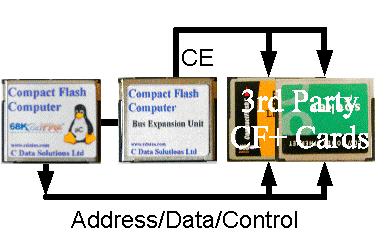
Complete systems can now be snapped together using CF form-factor cards!
The Compact Flash Computer measures 1.5 x 1.7 x 0.2 inches (37 x 43 x 5 mm), the dimensions of a CompactFlash Type II card. It is based on a Freescale MPC5272, a highly integrated 66MHz system-on-chip (SoC) processor said to deliver 63 Dhrystone 2.1 MIPS (millions of instructions per second). The chip integrates a 10/100 Ethernet controller with dedicated DMA, USB module, SDRAM controller, dual UARTs, and a number of other peripherals; however, the CFC card does not implement any of the MPC5272's peripheral interface functions other than the signals needed to interface with CompactFlash cards as well as the RS232 serial port, BDM (background debug mode) interface, and SPI interface. The CFC's processor is clocked at 40 MHz and draws 150 mA at 3.5 VDC, according to the module's data sheet. The CFC's metal, rather than plastic, case is expected to dissipate sufficient heat to run the module at 0 to 70 degrees C.
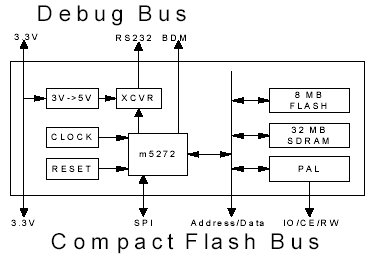
Block diagram of the Compact Flash Computer CF card
As indicated in the above block diagram, the Compact Flash Computer includes 32MB of SDRAM and 8MB of Flash memory, and comes with the ppcboot bootloader and a uClinux based operating system. It also comes with GNU tools (gcc/gdb) and the necessary support for BDM-based debugging.
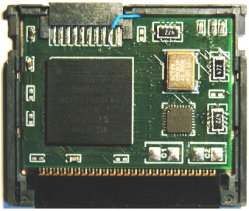
Inside the Compact Flash Computer CF card
(Click above image for larger view)
In high quantity product designs, C Data anticipates that many of its customers will want to use the CFC as single-component Linux computer that plugs into custom circuit boards which route signals from the CFC's CF bus to whatever else is required by the application (including additional CF memory and I/O card sockets). However, for the convenience of building-block designs, and for evaluation and development purposes, the company currently offers the following optional add-on modules that handle memory and I/O expansion and power conversion:
- Bus Expansion Unit — also in a Type II CompactFlash format. Although you can interface the CFC directly to a single CF card (given the appropriate 2-slot “backplane” busing), the BIU allows the “card enable” signals from the CFC to be gated to different cards. This demuxing of the CE signals is controlled by commands over the SPI bus. The BEU also contains a switching power supply that converts a 5-10V supply to regulated 3.3V at 500mA.
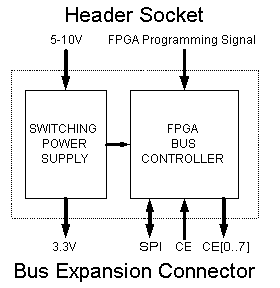

The Bus Expansion Unit and function diagram - 8-slot backplane — holds up to 8 Type II cards with 5mm of spacing. Can take power from Bus Expansion Unit or the RS232/DBM header.
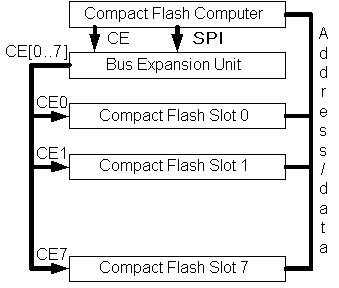

The 8-slot backplane and function diagram - RS232/DBM Header — provides standard DB9 and 26-pin ports serial ports, along with a regulated powered supply of 3.3V @ 500mA.
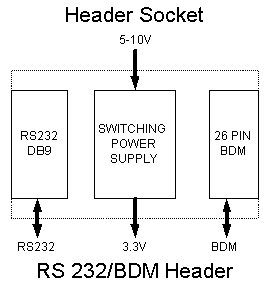

The RS232/BDM header and function diagram
Availability and pricing
The Compact Flash Computer and associated companion cards are currently in “pre-production,” according to C Data managing director Paul Zawalnyski. Although pricing for the diminutive Linux computer modules won't be finalized for several weeks, Zawalnyski says he expects it to be less than $800 for an evaluation unit, with substantial quantity discounts. C Data Solutions is located in Exeter, Devon, in the southwest of England.
This article was originally published on LinuxDevices.com and has been donated to the open source community by QuinStreet Inc. Please visit LinuxToday.com for up-to-date news and articles about Linux and open source.